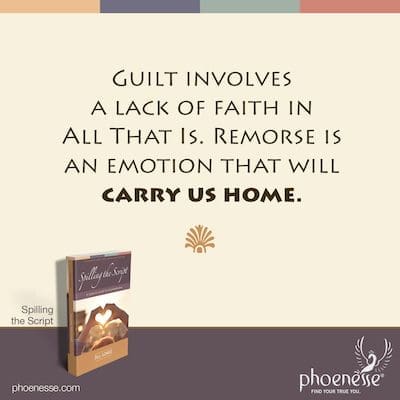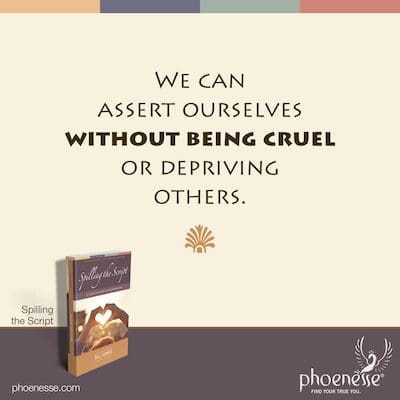Because our drive for pleasure gets attached to destructiveness, we experience guilt due to the ways we inflict pain on others. But if we can’t feel the pain of what others did to us, we can’t feel the pain of our guilt for what we do to others. We need to open to feeling the pain caused by our withholding, spite and maligning. That is, we need to have genuine remorse for the pain we cause and not get lost in false guilt.

It may help to understand the difference between guilt and remorse. When we feel guilt, we are in effect saying, “I’m beyond redemption and deserve to feel devastated.” We feel this way because we believe that our Lower Self is all of us. We need to be aware of this powerful and dangerous wrong thinking. It’s not true and it’s an insult to God and all of creation, of which we—including our Higher Self—are an integral part.
Our self-devastating guilt also integrally links with our distrust of life. Our guilt causes us to cut ourselves off from the flow of divinity. We do this by going immediately to whitewashing our faults and failings. Yet these, of course, are the areas we need to be facing and honestly owning.
With remorse, we are simply recognizing where we fall short—our faults and impurities, our shortcomings and limitations—admitting that there are parts of us that violate spiritual law. We feel regret and are willing to admit the truth about our destructiveness. We recognize that it’s a useless waste of energy and hurts others and ourselves. And we sincerely want to change. With remorse, our self-confrontation is completely different from self-devastating guilt.
If we feel remorseful, it is possible to say, “It’s true that I have this or that shortcoming or fault—I’m petty or dishonest, I have false pride or hatred or whatever—but this isn’t all of who I am. The part of me that recognizes, regrets and wants to change is aligning with my divine self—my Higher Self—which ultimately will overcome whatever I feel remorseful about.” In this case, the “I” that can dislike aspects of ourselves and wants to change those destructive, untruthful, deviating aspects doesn’t fall apart, even as it notices that we need to heal something.
Guilt involves a lack of faith in All That Is. Remorse is an emotion that will carry us home. Because feeling the sadness of the effects of our Lower Self motivates us to discover the true source of all life.

Guilt also arises from a distortion of our urge for self-realization. In our competitiveness, we try to measure what cannot be measured: one person versus another. Our push for specialness comes from this belief that we can—and need to—triumph over others.
We need to learn to see the truth about limitless abundance—that our individuality is never in conflict with anyone else. Also, we can assert ourselves without being cruel or depriving others. We can give up our immediate advantage for the sake of others. We can say Yes to ourselves without saying No to others. Love and self-exertion can co-exist. Giving fulfillment to ourselves allows us to give to others. After all, we can’t give what we don’t have.
Return to Spilling the Script Contents



